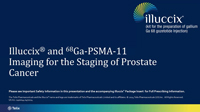To access a webinar, you must be a registered user of TelixU and logged in.
New webinars are frequently added to TelixU, therefore we encourage you to return often to participate.
Each on-demand webinar delivers current and relative information about PSMA Imaging and is supported by content that is developed and delivered by KOLs and industry leaders.
* 18F-FET-PET in Glioma
Presented by:
Ian Law, MD, PhD, DMSc

Discover the clinical benefits of FET-PET in evaluating newly diagnosed brain tumors, its role in distinguishing tumor progression from treatment-related imaging changes, and its use in monitoring glioma treatment.
Webinar
|
* Metabolic Imaging with Amino Acid PET from a Neuro-Oncologist’s Perspective
Presented by:
Norbert Galldiks

Learn more about the clinical utility of amino acid PET imaging in diagnosis and managing primary and secondary brain tumors, including it’s advantages over conventional imaging methods, particularly in tumor delineation, distinguishing treatment related changes, and monitoring treatment response
Webinar
|
Illuccix® and PSMA Imaging for the Initial Staging of Prostate Cancer
Presented by:
Umesh Oza, MD | Naveen Kella, MD

In this program, Dr. Umesh Oza and Dr. Naveen Kella discuss the use of 68Ga-PSMA-11 for effective prostate cancer staging. This webinar is designed for clinicians seeking to enhance their understanding of PSMA imaging in the context of prostate cancer management. Key topics include differentiating the benefits of gallium-based PSMA imaging compared to conventional methods for detecting suspected metastatic disease. The session will also feature patient case studies to analyze the real-world effectiveness of Illuccix.
Webinar
|
PSMA PET/CT: Integrating Imaging with the Care Team
Presented by:
Delphine Chen, MD | Colin Hayward, MBBS, FFPM | Daniel W. Lin, MD | Preston C. Sprenkle, MD | Darko Pucar, MD, PhD

The goal of this program is to achieve maximum impact of improved patient care by addressing the fact that members of the patient management team have specific clinical questions that need answering in order to properly treat Prostate cancer. The impact in patient care and outcomes is improved if the clinical answers accurately guide the patient’s journey.
Educational Objectives
-
Review the needs of the care team members in order to deliver clear and concise PSMA PET/CT reports to facilitate prostate cancer management.
-
Explain why urologists and radiation oncologists need an accurate description of all sites of local, regional, and metastatic prostate cancer to optimize treatment planning and oncologic outcomes.
-
Explain why medical oncologists need accurate information from PSMA PET/CT for staging, restaging, and treatment response assessment of prostate cancer.
-
Optimize the communication between the members of the patient management team.
-
Develop standardized guidelines for PSMA PET/CT reporting to optimize intra- and inter-institutional clinical care and research, including multi-institutional clinical trials.
Webinar
|
PSMA Imaging: Current Status & Prospects
Presented by:
Jeremie Calais, MD, MSc | R. Jeffrey Karnes, MD, FACS | Oiver Sartor, MD

This educational webinar features a panel of experts from Nuclear Medicine, Urology and Oncology, who are involved in the diagnosis and management of Prostate Cancer. By understanding the benefits of PSMA imaging, a Urologist’s timely referral can positively impact the patient’s journey and ultimately their quality of life. The clinical benefits of a prompt and accurate diagnosis of Prostate cancer, using PSMA-11 PET/CT, will be reviewed by the faculty.
Educational Objectives
-
Discuss the clinical benefits of PSMA Imaging for the diagnosis and management of prostate cancer.
-
Describe patient considerations for 68GA PSMA-11 PET/CT.
-
Articulate the clinical implications supporting the timely diagnosis of prostate cancer.
-
Adopt guidelines of when to order 68GA PSMA-11 vs other imaging modalities (Bone scan, CT, MRI).
-
Implement PSMA Imaging practice considerations to improve outcomes and patient management.
Webinar
|
Prostate Cancer Training
Presented by:
Sanoj Punnen, MD, MAS

This webinar provides a comprehensive review of Prostate cancer from the urologist’s perspective. It is vital to understand this complex disease and the impact it has on the patient. Proper diagnosis and disease management can improve outcomes. With the recent introduction of PSMA PET imaging, the urologist is tasked with understanding how this biomarker known as Prostate-Specific Membrane Antigen (PSMA), should be employed during the patient’s journey vs the use of conventional imaging such as bone scan, CT, and MRI.
Educational Objectives
A review of important aspects of Prostate cancer including:
-
Epidemiology, Clinical Presentation, and Etiology
-
Prostate Anatomy and Physiology
-
Prostate Cancer Early Detection, Diagnosis, and Staging
-
Treatment Modalities and Guidelines
-
The Patient’s Journey and Disease Management
-
Prostate-Specific Membrane Antigen (PSMA)
Webinar
|
68GA PSMA-11: Advances in Technology, Demand & Supply | Industry Leaders’ Round-Table Discussion
Presented by:
Dr. Christian Behrenbruch | Jean Bonnet | Delphine Chen, MD | Serge Lyashchenko, PharmD | Uno Zetterber

This webinar offers perspectives from Industry Leaders and Nuclear Medicine physicians on recent advances in PSMA-PET Imaging and how the radiopharmaceutical industry might respond to the supply chain demand for PSMA-PET imaging products and isotopes. Discussion topics include insights into isotope production, distribution, and supply chain, as well as the impact on the physicians’ practice. This is a robust discussion supporting the steps and the players who are coming together to support Gallium production and distribution to aid Nuclear Medicine physicians, referring physicians, and ultimately the patients
Educational Objectives
-
Review of current Isotope production, distribution and supply chain demands of Gallium.
-
Provide answers to questions about the increased demand for Gallium and address the anticipated impact it will have on healthcare providers and patients.
-
Discuss the importance of securing manufacturers & distributor partnerships in order to meet the increased demand for Gallium to support PSMA Imaging.
-
Explain several corporate plans of action including, Cyclotron, solid target, producers, and distributors.
-
Deliver insights into the requirements and steps for 68Ga PSMA- 11 dose preparation and the timely delivery to Nuclear Medicine.
-
Describe the clinical benefits of 68Ga PSMA-11 dose flexibility for a Prostate cancer patient.
Webinar
|
Clinical Utility of PSMA PET/CT in Prostate Imaging
Presented by:
Sanoj Punnen, MD, MAS | Preston C. Sprenkle, MD | Scott T. Tagawa, MD, MS, FACP | Clint D. Bahler, MD, MS

This program is designed to enlighten the Prostate cancer care team about the importance of PSMA Imaging and its impact on patient management and care. This multidisciplinary panel discussion provides clinical perspectives on the utility and the implications of using PSMA PET/CT as a theranostic approach and identifies best practices through the shared clinical experiences of Urologists and Medical Oncologists.
Educational Objectives
-
Increase confidence in the clinical benefits and utilization of PSMA PET/CT in the management of Prostate cancer.
-
Improve treatment planning by advancing the clinical understanding of the extent of disease including: initial diagnosis, BCR, nmCRPC, and mCRPC.
-
Implement clinical options supporting specific applications for Prostate cancer staging, i.e. local disease management vs metastatic disease, surgical planning, radiation therapy planning and systemic therapy or, a combination of these.
Webinar
|